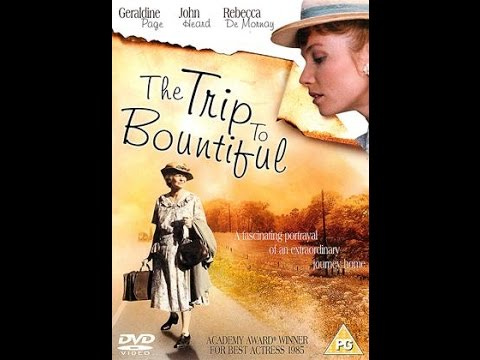Our Word of the Week, road, gives us a lot of chances to recommend again movies we’ve featured here — really fine movies, such as The Wizard of Oz and Dorothy and her dog Toto and her three faithful friends, singing along the Yellow Brick Road; or my vote for the greatest screwball comedy ever, a surprisingly profound film that shaves close to tragedy, Sullivan's Travels; or the romantic comedy that takes place mainly on the by-ways getting from Florida to New York, also the by-ways getting from misunderstanding to love, Frank Capra’s wonderful It Happened One Night. So by all means, check them out! But here we’ve got another work by that sensitive and quietly Christian storyteller, Horton Foote, The Trip to Bountiful.
The year is 1947, just after the World War. An old lady, Carrie Watts (Geraldine Page), is living with her son and her daughter-in-law in Houston. It’s urban, and a bit shabby, certainly not rich, and not vibrantly human, at least not for somebody who never grew up in such a place. Her son Ludie loves her, but he’s married to a bit of a shrew, Jessie Mae, and to say that the three don’t get along is an understatement. (Because this is the screen writer Horton Foote we’re talking about, their quarreling doesn’t get foul or absurdly exaggerated — it doesn’t need to). Old Mrs. Watts isn’t in the best of health, so when she says that she’d like to take a trip to Bountiful, a rural village on the Gulf Coast in the direction of Corpus Christi, Ludie doesn’t want her to go alone, and Jessie Mae doesn’t want her to go at all, because, she says, they don’t have the money to waste on bus tickets. It has to be a bus, by the way, because the train that used to go there doesn’t run anymore. Mrs. Watts has all sorts of kindly memories of that noble place, of the big white house, and the gardens, and the courtly people who lived there. She wants to go to the place she honors as her real home — as I said, to Bountiful.
And sure enough, the old lady — who’s got as much vinegar in her as she has sugar — outwits her son and daughter-in-law and gets on that bus, barely scraping together a few dollars for the trip. And most of the film is that trip, the bus ride, her meeting a friendly young lady who is also displaced, her being caught up with by a wise sheriff (Richard Bradford), the chase after her by Ludie and Jessie Mae, and what we at last see that is left of the place she once knew and loved.
Geraldine Page won the Oscar for Best Actress, for her utterly captivating portrayal of an old lady who seems to have outlived her time. I think of her what I think of several other actors and actresses who were born too late, so that during their mature years, the movies had passed them by — for who but a Horton Foote here or there would write a script that did not use lust or gore or “special effects” to lure the audience? For a similar film in a masculine key, you might check out The Straight Story (1999), which one of these days we’ll likely recommend here. I don’t want to give away the ending of our Film of the Week, except to say that the trip to Bountiful that Mrs. Watts takes will be a trip toward something human, not a dream of the rich past, and not of a glorious future, but somehow better than those. Watch, and let us know what you think.
Note: Our full archive of over 1,000 posts, videos, audios is available on demand to paid subscribers, but our most recent free content remains open to all subscribers for some weeks after publication. We know that not everyone has time every day for a read and a listen. So we have built the archive with you all in mind. Please do browse, and please do share posts that you like with others.
Thank you, as always, for supporting our effort to restore every day a little bit of the good, the beautiful, and the true.




Poignant and beautiful film. I need to see it again. Now that I’m a bit older since I first saw it, I’m sure I will feel a certain affinity with Mrs. Watts.
"Tender Mercies" is another beautiful Horton Foote film worth watching; Robert Duvall won the Best Actor Oscar. Interestingly, the producers of "Trip to Bountiful" ran out of money part way through filming and had to cease production until they could raise funds. It was worth the effort. John Heard's monologue at the end of the film is heartbreaking. I love Foote's writing!